With Scotland a big story right across the world just now, we thought we’d take a look at some of the stories told about Scotland. The referendum has inspired much reminiscing about Braveheart but there’s a wealth of other Scottish films out there that too often get overlooked. Our Scottish writers got together to pick out a top ten that we hope will remind you of some old favourites ad inspire you to sek out some exciting new talent.
The hardest thing about compiling this list was, as always, deciding what to leave out. Regrettably the excellent documentary We Are Northern Lights, in which hundreds of Scots provide their own takes on their country, didn’t quite make the grade, and neither did the enchanting Gaelic language fable Seachd: The Inaccessible Pinnacle. Some classics, like Gregory’s Girl and Whisky Galore, inevitably got left on the shelf, but not for want of love. All we can give you here is a taster but we hope it will be enough to show that Scottish cinema is diverse, exciting, and very much alive and kicking today.
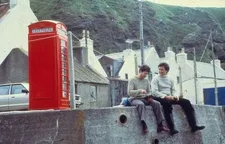 |
| Local Hero |
10 Local Hero
We begin with an old favourite, made in 1983 by celebrated maverick Bill Forsyth. With Burt Lancaster as an oil tycoon, Peter Riegert as an ambitious young executive, and a splendid cast of locals including Peter Capaldi, Denis Lawson and Fulton Mackay, it’s the story of a rich American getting more than he bargained for when he assumes he can outwit villagers and buy up their land (cynical viewers will find echoes of this in Anthony Baxter’s recent documentary take on Donald Trump, A Dangerous Game). We love it for its playful wit, its gorgeous cinematography, and its sweet conclusion that ultimately there’s always room for friendship, even in the most unlikely situations.
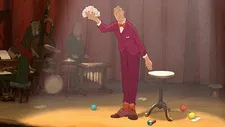 |
| The Illusionist |
The opening film at the 2010 Edinburgh International Film Festival, this charming story about an ageing stage magician and his unexpected apprentice may have been made by a Frenchman (Sylvain Chomet, working from a script by the great Jacques Tati) but it’s full of Scottish character. Its animated Edinburgh is fantastically detailed and it’s often the little background details that will have you laughing out loud. We love it because it finds big things to say in a small story; because of the elegant way its blends tragedy, joy and humour; and because, before we saw it, we might have said that they don’t make ‘em like this any more.
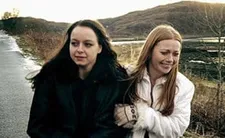 |
| Samantha Morton with Kathleen McDermott in Morvern Callar |
Released in the same year as Minority Report (2002), this film was a real breakthrough for Samantha Morton and features one of her finest performances to date. The eponymous Morvern reacts to her boyfriend’s suicide by cutting up and secretly burying his body, passing off his novel as her own work, and leaving her drab Edinburgh housing estate for the Costa Del Sol – but it’s her alienation from everyone around her than really fascinates. There’s a subtle exploration of class issues here, but using a female protagonist moves it away from the more familiar territory of films like Peter Mullen’s semi-autobiographical NEDS and Garry Fraser’s bleak documentary Everybody’s Child, and its willful defiance of expectations, together with the sparseness of its dialogue, gives it a more existential character. We love it because it’s bold, beautifully shot, and truly individual.
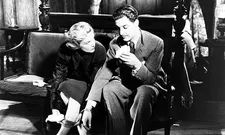 |
| The 39 Steps |
Alfred Hitchcock’s only Scottish film, based on the novel by Scottish author (and baron) John Buchan, this is the oldest film to make our list but it remains every bit as thrilling as it was on release in 1935. Anticipating the master’s Saboteur in its tale of a wrongly accused man who goes on the run to try and solve a mystery, it starts Robert Donat opposite the beautiful and suitably forceful Madeleine Carroll as a hostage who refuses to play along. Pivotal chase scenes take place in Glen Coe, recently admired by viewers of Skyfall, as well as in Edinburgh. Unfortunately some of the ‘Scottish’ accents come from much further afield, but we love it for its suspense, its fantastic use of light and shadow, and its sharp dialogue.
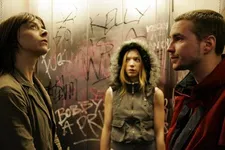 |
| Red Road |
6 Red Road
A woman (Kate Dickie) whose job is to monitor CCTV cameras becomes obsessed with a man (Tony Curran) she sees on her screen – but who is he, what has happened between them, and which of them is a danger to the other? Andrea Arnold’s quietly devastating film (made in relation to the Dogme project with help from Lone Scherfig, whose Wilbur Wants To Kill Himself shares its Glasgow setting and dark humour) explores power, surveillance and exposure through a story that goes to extremes but always feels real. We love it because it’s brutally honest, unapologetically difficult and, in places, genuinely surprising.
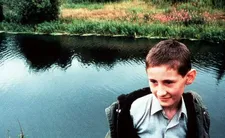 |
| Ratcatcher |
Lynne Ramsay is the only director to have two films on this list; this 1999 take on 1973 was her début but still seized the attention of critics at Cannes. It features a stunning performance from William Eadie as a 12-year-old growing up in poverty and wracked with guilt after the drowning of his friend. Ramsay teases out the brutality common in childhood, with scenes of animal cruelty, sexual abuse and gang violence, yet also shows how little it takes to feed her young protagonist’s imagination, and how keenly he delights in beauty. We love it for its intensity, its keen observation and its ability to find poetry in the darkest places.
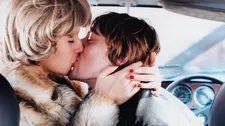 |
| Under The Skin |
We’re wary of getting too excited about recent films because it can take time to analyse them fully, but all our writers who have seen this surreal 2014 science fiction oddity are unanimous in praising it. It’s also interesting because it stars many ordinary Scots who didn’t know they were in a film until their scenes were complete and they were asked to give permission for their use. They are among the men approached by Scarlett Johansson’s lonely alien, a predator who finds herself in trouble as she starts to identify with her prey. We love it because it’s a true original, visually and thematically innovative, and obscurely romantic.
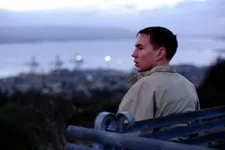 |
| Sweet Sixteen |
A Greek tragedy disguised as a West of Scotland kitchen sink drama, Ken Loach’s 2002 drama is notable for launching the career of Martin Compston, who stars as a well-intentioned kid who gets into drug dealing in the hope of reuniting his family and getting his imprisoned mum a proper home. With affectionately presented teenage humour counterpointing the darkness of gangland scenes, it shows boys thriving in a tough environment like weeds in asphalt, but there’s still a sense that those born in the schemes can never escape their destiny. We love it because it’s joyously naturalistic, perfectly acted and always one step ahead.
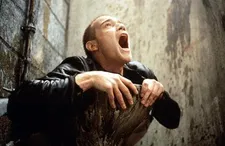 |
| Trainspotting |
As Jimmy Carr noted, Scotland is not all heroin and shortbread, but inevitably those subjects will be addressed, and none has taken on the former with as much wit and verve as this. Though things didn’t work out as well for Irvine Welsh’s Ecstasy and Filth was never the massive success fans felt it ought to be, everything came together in this case, with Ewan McGregor’s star rising fast after Shallow Grave and a last minute spot at Cannes generating eager support from critics. Tight dialogue, perfectly stylised ensemble acting, Danny Boyle’s inspired direction and a fantastic soundtrack guaranteed it cult status, whilst it was praised by drug-using communities for its authenticity. We love it for its energy, its irreverence and its bite.
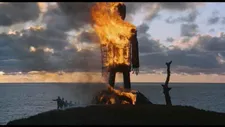 |
| The Wicker Man |
After 41 years this still just managed to inch its way into the number one spot on our list, our reviewers’ fondness it perhaps revived by the 2013 director’s cut. It remains enormously popular with the public – mention you’re a film critic in Scotland and this is still the film strangers most want to talk to you about. Perhaps its power is in its timelessness, as the island community at its heart could easily still be leading its parallel existence today, and the country has not altogether run out of uptight police officers keen to advance their notions about proper morality. Edward Woodward and Christopher Lee both give unforgettable performances, and the story – of a search for a missing girl that leads to unexpected discoveries – retains its power. We like it because it’s completely original, it turns Scottish stereotypes upside down and it helped to reinvent the horror genre. It’s still inspiring filmmakers today.





















